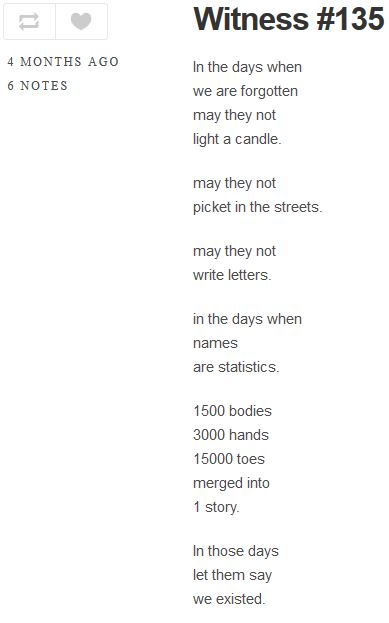On one level, ICC Witness #135 might be an effort to speak for the dead, which is a slightly different thing than speaking for the survivors. Survivors, after all, can speak for themselves, and do. The dead do not. They can be forgotten; they cannot remember themselves, in the ways that survivors do and must. Indeed, we might find a certain tension creeping into this poem between the voices of the survivors and non-survivors, a tension between the different kinds of pain and loss that get remembered: if the dead are mourned by the survivors, for the survivors, the fact of being dead means that precisely nothing can be done for them. Hamlet's father is not a ghost; he's a piece of Hamlet, crying out in pain.
 The dead are not asking for redress of their grievances, because they have no grievances. The dead do not ask you to light a candle in their memory, nor want you to picket in the streets or write letters. They do not want you to do these things, because they do not want. They do not. They are not. Not.
The dead are not asking for redress of their grievances, because they have no grievances. The dead do not ask you to light a candle in their memory, nor want you to picket in the streets or write letters. They do not want you to do these things, because they do not want. They do not. They are not. Not.
The "we" of the poem cannot want these things--because it cannot want--so the poem doesn't function as an expression of an actual desire ("we want"), and such a thing can't actually obtain. Rather, it functions as the performative outline of that impossible constative. This present-tense "we" is fictional, because it does not exist in the present tense, nor does or could its desired articulation of a desire: we want them to desire, because we want them not to not. This desire is narcissistic, of course, though there's nothing wrong with that; we want "them" to want, because we want them, but we are the ones doing the wanting, the only ones who can. So there is a certain defensive structure of denial in the pretense that the dead could want: if we let it be their desire, not ours, then our desire that they be is no longer motivated by the fact that they aren't. The wound disappears if they can want, themselves.
There is something horrible, then, in the voice of the dead--who, we know have no voice, being dead--instructing us on what they don't want, because they don't want; as the performative statement pushes the impossible constatative off-stage, we must face the reality that candles, letters, and pickets are for the living, however much they are voiced in the name of the dead. There is no rebuke in saying so, of course, and the poem is gentle: it is enough, speaks the voice of the dead, not to be. And this is not the voice of the dead, anyway. This is the voice of the living, allowing the dead not to be (allowing themselves to allow the dead not to be). This is a horrible thing, a thingness that evokes horror, and psychological complexes. But it also is, and simply.
Previous:
